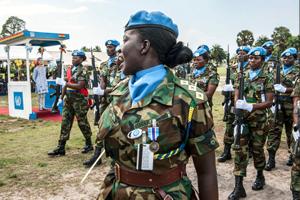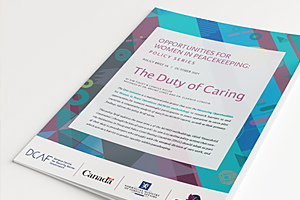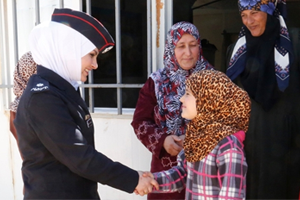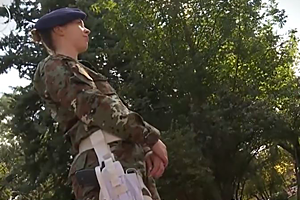Why gender equality matters in SSG/R
Achieving gender equality in the security sector involves making transformational change in how the security sector institutions operate which in turn leads to operational effectiveness. From ensuring that women have equal opportunities, that there is gender balance in police and military forces, to eliminating sexual harassment, and giving legal bodies the right tools and knowledge to defend women’s rights, the challenges are myriad. And success depends in large part on a shift in institutional culture to put the principles of equality at the heart of both policy and practice.
What are the needs and the gaps to achieving equal respect and opportunity? Who are the main agents of change? The answers may vary because each country, culture, and institution is different. But effective and proven solutions supporting gender equality can be put in place.
- Create respectful, non-discriminatory work environments, flexible work policies, mechanisms aiming to redistribute the burden of care work, and human resources management systems that value diversity and inclusivity.
- Change beliefs and attitudes, including the mindsets of male personnel who are still overrepresented, and of the people in charge who act as role models.
- Support authentic and committed leadership at all levels to encourage the required change.
- Set up strong accountability mechanisms, such as functioning sexual harassment complaints mechanisms.
In addition to the actions taken at the local level, international frameworks, such as the Women, Peace and Security Agenda, and the Sustainable Development Goals, help gender equality remain a key component of SSG/R processes and policies around the world.
Backed by 20 years of operational experience in dozens of countries, we promote gender equality in all aspects of security sector reform and governance. Check the below resources to learn more.

READ: Stop fixing women
Security sector institutions expect women to adapt to discriminatory work environments and to prove their worth in a man’s world. It is not what will make them stay. Read real solutions that will drive long-term and sustainable institutional transformation.

WATCH: Gender and security video series
This series of seven engaging, innovative, and informative animated films on Gender and Security is designed especially for those working in and with security and justice sector institutions. Learn about how Gender bias harms the security sector, why gender matters in policing and armed forces and more.

READ: Opportunities for women in peacekeeping: policy series
Recognizing the historically low participation of women in peacekeeping operations, the United Nations set targets to improve the gender balance. Among them, by 2028 women should make up 15% of military contingents and 20% of police units. Progress has been slow, however. This new series of policy briefs debunks the myths that have stalled significant structural change in peacekeeping, and introduces new narratives, based on the results of the Measuring Opportunities for Women In Peace Operations (MOWIP) methodology.

READ: Gender and security toolkit
The nine tools provide handy, practical resources and effective ways to work toward gender equality – including through inclusive leadership, gender analysis, gender training, improving women’s participation, strengthening oversight, and collaboration with civil society.
Each tool shares concrete experiences from around the world and in local projects.

WATCH: Gender balance in the army and security services in North Macedonia
Get insights on gender sensitivity and responsiveness in North Macedonia from women in the military forces, working for the Ministry of Interior, or intelligence agency. The testimonials highlight how professional and leadership skills are not dependent on gender and how maintaining a system of values through promotion and rewards, regardless of gender will lead to equal participation of men and women in the Army and the security services.
 Share on Facebook
Share on Facebook Share on Linkedin
Share on Linkedin Share on Twitter
Share on Twitter